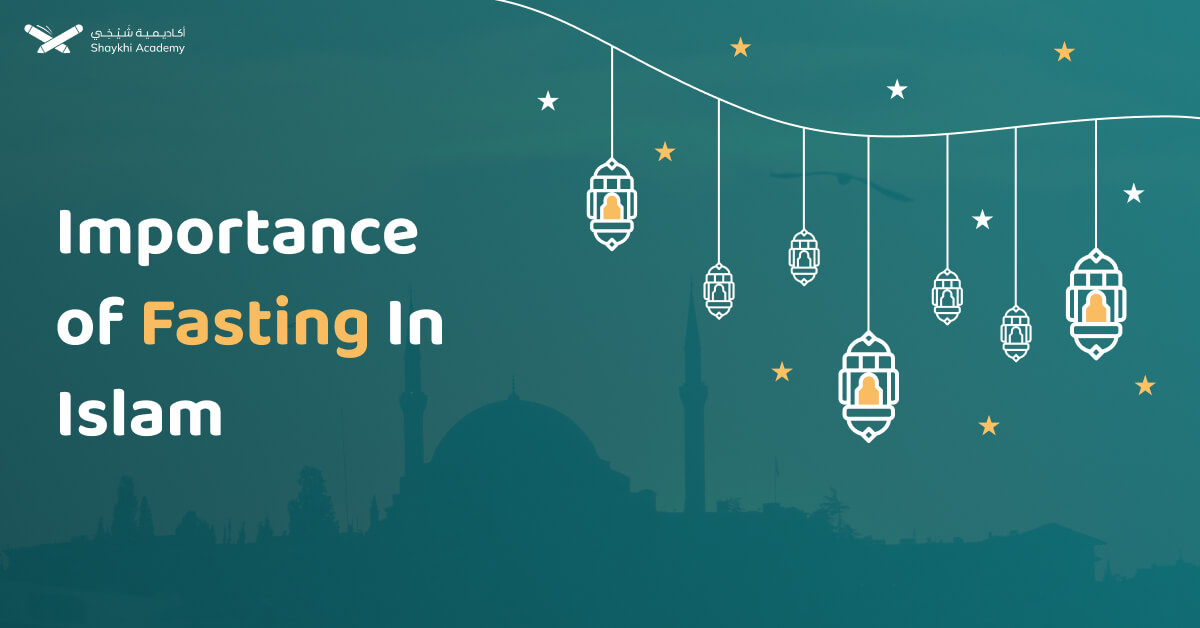Fasting holds educational importance as it teaches valuable lessons of patience, discipline, and self-control. By abstaining from food and drink during specified hours, individuals learn to exercise restraint over their desires and impulses. This fosters a sense of self-awareness and promotes balanced living, both spiritually and physically. Through fasting, Muslims cultivate virtues that are essential for personal growth and moral development.
Furthermore, fasting has social significance as it fosters empathy, compassion, and equality within communities. Experiencing hunger and thirst during fasting enables individuals to empathize with the less fortunate and encourages acts of charity and kindness. This shared experience strengthens bonds of brotherhood and solidarity among Muslims, regardless of their socioeconomic status, fostering a sense of unity and compassion.
Importance Of Fasting In Islam:
Fasting in Islam holds profound significance as a means of spiritual growth, self-discipline, and devotion to Allah. It serves as a powerful tool for self-improvement, purification of the soul, and attaining nearness to Allah. By observing fasting during Ramadan and throughout the year, Muslims strive to embody the virtues of patience, gratitude, and humility, ultimately seeking Allah’s pleasure and eternal reward.
1. The Divine Commandment of Fasting:
The importance of fasting in Islam is emphasized in the Quranic verse, where Allah commands believers to fast as it was prescribed for those before them, with the intention of attaining piety. Fasting during Ramadan involves abstaining from all food and drink from dawn until sunset, with the intention of seeking closeness to Allah and purifying oneself from sins and immoral behavior.
2. Benefits of Fasting:
The benefits of fasting are manifold, ranging from spiritual purification to psychological and physical well-being. Fasting helps discipline the soul, curbing desires and temptations, and strengthening one’s connection with Allah. It serves as a shield against wrongdoing and a means of attaining Allah’s forgiveness and mercy. Additionally, fasting fosters empathy and compassion towards the less fortunate, instilling a sense of gratitude and generosity in the fasting individual.
3. Personal and Hidden Devotion:
Moreover, fasting is a form of worship that is purely between the individual and their Creator, free from any external displays of piety or recognition. Unlike other acts of worship that may be subject to ostentation or showing off, fasting remains a deeply personal and hidden form of devotion, known only to Allah. It is a means of seeking Allah’s pleasure and reward, with the fasting individual rejoicing both at the time of breaking their fast and when meeting their Lord, knowing that their efforts have been accepted and rewarded.
4. Religious Significance of fasting:
Fasting holds a sacred place in Islam, strengthening willpower, determination, and one’s spiritual self. By adhering to the commandments of God, individuals can overcome their desires and gain control over them, fostering strong and resolute willpower. This practice signifies that individuals are servants of their Creator, not slaves to their whims and desires.
5. Educational Importance of fasting:
Fasting educates individuals about patience and enhances mental maturity. By abstaining from food and drink during specified hours, individuals learn to exercise restraint and discipline, which are essential virtues in both personal and social spheres. This fosters a sense of self-awareness and self-control, promoting a balanced and harmonious lifestyle.
Unlock the Path to Quranic Mastery with Shaykhi Academy!
Are you seeking the finest Quranic education right from the comfort of your home? Look no further! Shaykhi Academy stands out as a premier online Quran learning platform, dedicated to providing exemplary education to both children and adults.
Why Choose Shaykhi Academy?
- Connect with highly qualified native tutors.
- Flexible scheduling to suit your busy lifestyle.
- Affordable classes tailored for all levels.
- Accessible from anywhere around the globe.
Discover Our Range of Courses:
- Arabic Noorani Qaida: Lay a solid foundation for Quranic studies.
- Online Quran Classes for Kids: Engaging lessons for lifelong learning.
- Tajweed Rules for Kids: Learn to recite with confidence.
- Quran Hifz for Kids: Step-by-step guidance to memorize the Quran.
- Quran for Adults: Introduce yourself to Quran reading and Tajweed rules.
- Online Arabic Courses: Master the language of the Quran.
- Islamic Studies: A wide range of topics related to Islam, including theology, law, Quranic studies, Hadith.
Don’t Miss Out on Your Chance to Excel!
Whether you’re a beginner or seeking advanced knowledge, Shaykhi Academy can guide you! Book your free trial now and make Ramadan 2024 your Quranic turning point!
6. Social Significance of fasting:
Fasting fosters empathy towards the less fortunate, as individuals experience hunger and need firsthand. This shared experience strengthens bonds of compassion among people, prompting the privileged to extend support and kindness to those in need. Moreover, fasting promotes social equality, as all Muslims, regardless of their socioeconomic status, observe fasting during the same period, fostering a sense of unity and solidarity within the community.
7. Health Benefits of fasting:
Fasting offers various health benefits, including prevention of diseases such as cancer, diabetes, and obesity. It allows the body to cleanse itself of toxins and promotes weight loss when coupled with healthy eating habits. Additionally, fasting regulates blood sugar levels, reduces cholesterol, and alleviates joint pain, contributing to overall physical well-being.
8. Spiritual Rewards of fasting:
Fasting is rewarded both in this life and in the hereafter. In addition to promoting physical health, fasting cultivates spiritual growth, strengthening one’s connection with God and fostering a sense of inner peace and contentment. It serves as a means of self-purificat
9. Fasting as a Shield:
Fasting serves as a protective shield, guarding individuals against the fires of Hell. It is narrated by Jabir (may Allah be pleased with him) that the Prophet Muhammad (peace be upon him) said: “Fasting is a shield with which a servant protects himself from the Fire.” (Ahmad)
10. Taming Desires:
Fasting helps restrain carnal desires and purifies them. The Prophet Muhammad (peace be upon him) advised young people unable to marry to fast as a means to control their desires. Ibn Mas’ud (may Allah be pleased with him) reported: “The Prophet (peace be upon him) said: ‘O young people! Whoever among you is able to marry, should marry, for it restrains the eyes and protects one’s chastity. And whoever is not able to marry, should fast, for it is a means of suppressing sexual desire.'” (Bukhari and Muslim)
11. Gateway to Paradise:
Fasting is a pathway to Paradise, as it draws believers closer to their Lord. Abu Umamah (may Allah be pleased with him) reported: “O Messenger of Allah! Show me an action to do through which Allah will benefit me.” He (peace be upon him) said: “Take to fasting, for there is nothing equal to it.” (An-Nasa’i)
12. Intercession on the Day of Judgment:
Fasting intercedes for its practitioner on the Day of Judgment. Abdullah ibn Amr (may Allah be pleased with him) reported that the Prophet Muhammad (peace be upon him) said: “Fasting and the Quran will intercede for the servant on the Day of Judgment. Fasting will say: ‘O Lord, I prevented him from food and desires during the day; let me intercede for him.’ And the Quran will say: ‘O Lord, I prevented him from sleeping during the night; let me intercede for him.’ And their intercession will be accepted.” (Ahmad)
13. A Means of Forgiveness:
Fasting during Ramadan leads to the forgiveness of sins. Abu Huraira (may Allah be pleased with him) reported that the Prophet Muhammad (peace be upon him) said: “Whoever fasts Ramadan out of faith and seeking reward, his previous sins will be forgiven.” (Bukhari and Muslim)
14. Abundant Reward:
The reward for fasting is immense and unbounded. Abu Huraira (may Allah be pleased with him) reported that the Prophet Muhammad (peace be upon him) said: “Allah the Almighty said: ‘Every action of the son of Adam is for him, except fasting. It is done for My sake, and I will reward for it.'” (Bukhari and Muslim)
15. Source of Happiness:
Fasting brings double joy: one at the time of breaking the fast and another upon meeting the Lord. Abu Huraira (may Allah be pleased with him) reported that the Prophet Muhammad (peace be upon him) said: “The fasting person has two occasions of joy: one when he breaks his fast, and the other when he meets his Lord.” (Bukhari and Muslim)
16. Divine Acceptance:
The foul breath of the fasting person, resulting from an empty stomach, is more fragrant to Allah than the scent of musk. Despite being disliked among people, this odor is beloved to Allah because it is a consequence of worship and obedience, signifying the greatness of fasting in the sight of Allah.

17. Fasting as a Pillar of Islam
Fasting during the month of Ramadan is one of the Five Pillars of Islam, making it an essential practice for every Muslim. It is an obligatory act of worship, and by fulfilling this command, Muslims strengthen their faith and devotion to Allah. The obligation is universal, and its performance is central to the completeness of a Muslim’s faith.
18. Means of Attaining Taqwa (Piety)
Fasting is a powerful means of achieving Taqwa, or piety, which is the core of a believer’s relationship with Allah. By abstaining from food, drink, and desires, Muslims become more mindful of their actions and thoughts, aligning their behavior with Allah’s commands and avoiding sinful temptations.
19. A Shield from the Fire
Fasting serves as a spiritual shield protecting the believer from the punishment of Hell. It is a means of safeguarding oneself from sinful acts, reinforcing self-control, and building resilience against worldly desires. This protection is emphasized in the teachings of the Prophet Muhammad (peace be upon him), who described fasting as a barrier to Hellfire.
20. Expiation for Sins
Fasting, especially during Ramadan, serves as a means of expiation for sins. By fasting with sincerity and faith, Muslims seek forgiveness for past transgressions and purify their hearts. The Prophet Muhammad (peace be upon him) assured that those who fast during Ramadan with the right intention would have their sins forgiven.
21. Intercession on the Day of Judgment
On the Day of Judgment, fasting will intercede on behalf of the believer. As narrated in the Hadith, both fasting and the Quran will act as advocates for their followers, seeking forgiveness and mercy from Allah. This intercession highlights the immense spiritual rewards of fasting, ensuring divine mercy and grace.
22. Purification of the Heart and Soul
Fasting plays a key role in purifying the heart and soul. It removes impurities and fosters virtues such as patience, gratitude, and humility. By focusing on Allah and abstaining from worldly distractions, Muslims cleanse their inner selves and strengthen their resolve to lead righteous lives.
23. Fostering Empathy and Social Solidarity
Experiencing hunger and thirst during fasting helps Muslims empathize with the less fortunate. This shared experience cultivates compassion, encouraging acts of charity and kindness. Fasting fosters a sense of unity among Muslims, as everyone, regardless of status, observes the fast and shares in the spirit of brotherhood.
24. Gratitude for Allah’s Blessings
Fasting cultivates gratitude by highlighting the blessings that are often taken for granted, such as food, drink, and physical comfort. By voluntarily giving up these blessings for a period of time, fasting reminds Muslims of their dependence on Allah and encourages them to be thankful for the provisions they receive.
25. Strengthening Self-Control and Discipline
Fasting is a powerful exercise in self-control and discipline. It teaches Muslims to monitor their actions, control desires, and stay mindful of Allah’s presence at all times. The fast acts as a training ground for developing personal discipline, encouraging believers to manage their impulses and behaviors in accordance with Islamic principles.
26. Pathway to Paradise and Eternal Reward
Fasting is a pathway to Paradise, drawing believers closer to Allah. The immense spiritual rewards for fasting, including the opening of Paradise’s gates and the closing of Hell’s gates during Ramadan, underscore the high value of this act of worship. The ultimate reward for fasting is eternal closeness to Allah and the joy of entering Paradise.
Conclusion:
In conclusion, fasting in Islam is a comprehensive act of worship that encompasses spiritual, personal, educational, and social dimensions. It serves as a means for individuals to attain taqwa, strengthen their bond with Allah, cultivate virtues, and foster empathy within communities. Through sincere observance of fasting, Muslims seek to purify their souls, strengthen their faith, and attain closeness to Allah.

















































